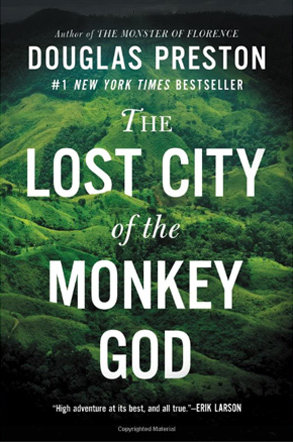BOOK REVIEW: Lost City of the Monkey God is riveting non-fiction; 5 stars out of 5
 I recently finished Douglas Preston’s fantastic The Lost City of the Monkey God. It is an adventurous and profound true story about the recent discovery of a 500 year forgotten city located deep in the cartel-riddled jungles of Honduras. I. Could. Not. Put. It. Down.
I recently finished Douglas Preston’s fantastic The Lost City of the Monkey God. It is an adventurous and profound true story about the recent discovery of a 500 year forgotten city located deep in the cartel-riddled jungles of Honduras. I. Could. Not. Put. It. Down.
Without spoiling the ending, this is what I wrote in my journal after pondering the finish for several minutes: “Survival of the fittest, a total inevitability, is difficult to accept. But survivors are not all criminals. Few of them actually are, in fact.
“Our modern existence is not a tragedy or sad story. Yes, death and destruction checker our past. But it does not define our existence. We are better off as a species because of our past, not in spite of it.”
Rating: ★★★★★
These were my favorite passages:
- “Who else could get a fucking helicopter in fifteen minutes in a country like Honduras? These guys here don’t appreciate what I do.”
- One of medicine’s greatest mysteries is why some people get sick and others do not, given the same exposure. Environment and nutrition play a role in infection, but genetics are paramount.
- Despite our dazzling technology, we are still very much at the mercy of pathogens, old and new.
- A staggering amount of suffering and death over thousands of years went into building European (and African and Asian) resistance to crowd diseases.
- A 90 percent mortality rate is high enough: It does not just kill people; it annihilates societies; it destroys languages, religions, histories, and cultures. It chokes off the transmission of knowledge from one generation to the next. The survivors are deprived of that vital human connection to their past; they are robbed of their stories, their music and dance, their spiritual practices and beliefs.
- No matter what, disaster would have ensued. This was a monstrous geographic accident waiting to happen. This was a time bomb that had been ticking for fifteen thousand years—counting down to that fateful moment when a ship with sick passengers finally set sail across the wide ocean.
- The world is now divided into Third and First, not Old and New. Pathogens once confined to the Third World are now making deadly inroads into the First. This is the future trajectory of disease on planet Earth. Pathogens have no boundaries; they are the ultimate travelers; they go wherever there’s human fuel.
- Global warming has opened the southern door of the United States not just to leish but to many other diseases. The big ones now entering our country include Zika, West Nile virus, chikungunya, and dengue fever. Even diseases like cholera, Ebola, Lyme, babesiosis, and bubonic plague will potentially infect more people as global warming accelerates.
- No civilization has survived forever. All move toward dissolution, one after the other, like waves of the sea falling upon the shore. None, including ours, is exempt from the universal fate.
